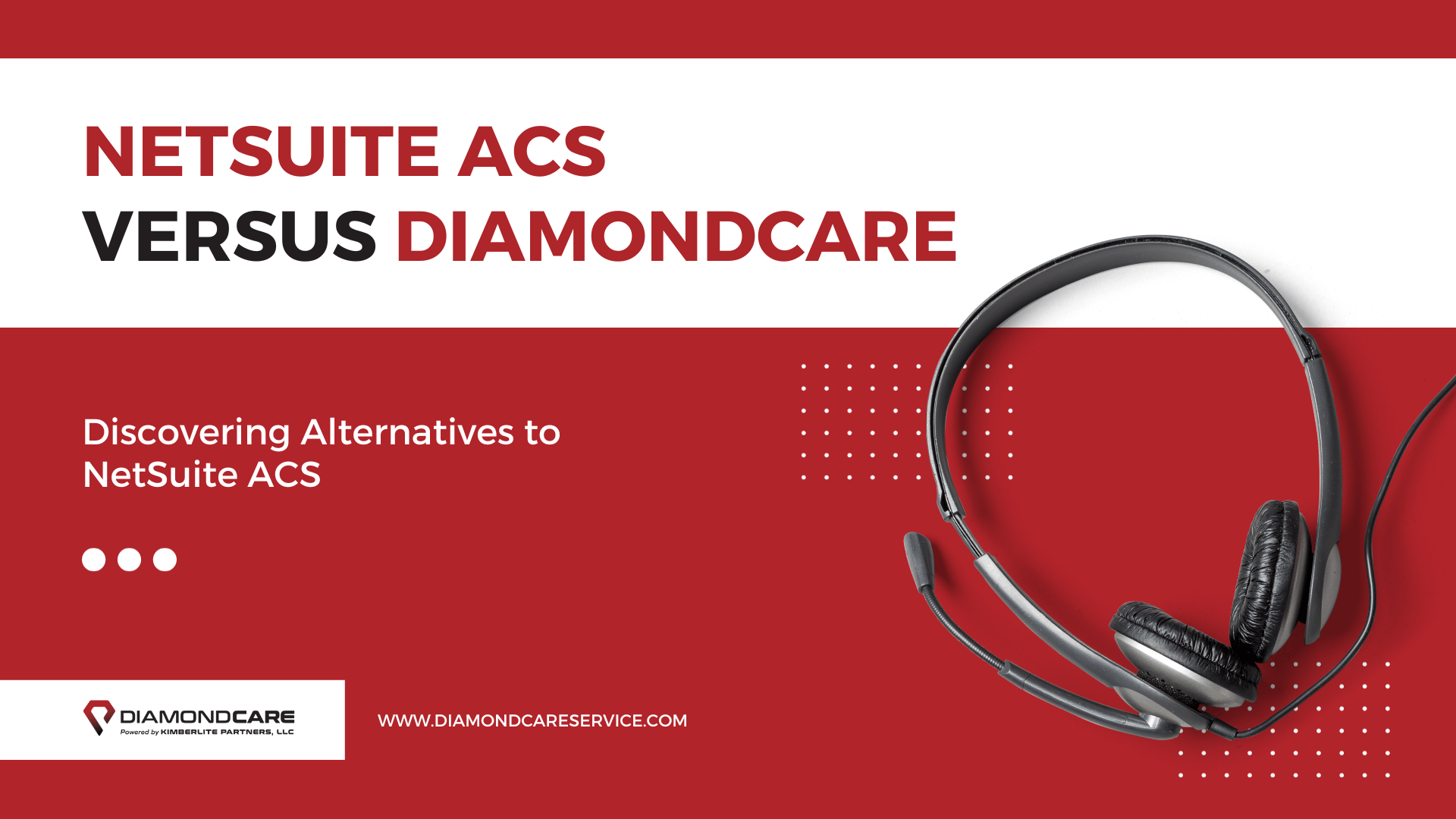NetSuite ACS vs. Kimberlite's DiamondCare - A Comprehensive Guide to NetSuite ACS Alternatives
In order to maximize their NetSuite return on investment, streamline business operations, and ensure that their decision to invest in NetSuite was...
.png?width=450&height=315&name=Untitled%20design%20(75).png)
Our experts guide you through every step — from planning to go-live — ensuring a smooth, successful NetSuite rollout tailored to your business.

Post-implementation support that goes beyond one-size-fits-all solutions.
Join a team that values growth, collaboration, and innovation. We believe in empowering people to do their best work while enjoying the journey.
9 min read
Admin : Sep 8, 2025 6:30:00 AM
NetSuite is a leading cloud ERP platform trusted by thousands of businesses. But as companies scale and operations become more complex, maintaining and optimizing NetSuite requires more than basic support. While many turn to NetSuite Advanced Customer Support (ACS) for ongoing help, real-world experiences suggest ACS isn’t always the right fit.
In theory, ACS promises proactive system management, performance tuning, and strategic guidance. In practice, however, many businesses find that ACS falls short—especially when they don't yet know what they need. As one user described in a popular online thread:
"They're good at following my requirements, but right now we don't even know what we need."
— Reddit user, F&B industry
Understanding the pros, cons, and real-world outcomes of ACS—and what alternatives can offer—is essential for maximizing the value of your NetSuite investment.
NetSuite Advanced Customer Support (ACS), often referred to as Advanced Customer Support NetSuite, is a premium support package designed to provide proactive, ongoing system management. ACS goes beyond standard customer support by offering strategic guidance to optimize your NetSuite environment, implement advanced configurations, and ensure smooth operations. Unlike traditional support, ACS emphasizes proactive system optimization and maintenance over reactive issue resolution.
With a monthly ACS subscription, you gain access to a dedicated Success Manager and solution advisement team. These experts work closely with your business to help you set and achieve your system goals.
ACS services are comprehensive, covering nine key areas:

ACS offers several levels of support—ACS Advise, ACS Monitor, ACS Optimize, and ACS Architect—each providing increasing levels of involvement and expertise to help businesses get the most from NetSuite:
ACS Advise offers foundational support with essential guidance, troubleshooting, and light configuration help.
ACS Monitor includes hands-on support for product-specific activities and assigns a dedicated consultant familiar with your business needs.
ACS Optimize provides full solution management, performance assessments, and support for product upgrades and process improvements.
ACS Architect is geared toward large organizations with complex configurations, offering a senior Customer Success Manager and a dedicated team of experts.
ACS Platform delivers technical advisory services for businesses with high data volumes or complex customizations, focusing on performance and scalability challenges.
NetSuite ACS promises to enhance your NetSuite environment through ongoing system optimization, customization, and proactive monitoring, helping prevent issues before they arise.
However, despite these benefits, businesses may have mixed experiences with ACS, as the expertise level can vary based on the assigned team. For companies requiring highly specialized support, exploring third-party alternatives may provide a more tailored solution.
 While NetSuite ACS is marketed as a premium, high-touch support model, user experiences tell a far more mixed story.
While NetSuite ACS is marketed as a premium, high-touch support model, user experiences tell a far more mixed story.
Across Reddit, Slack groups, and ERP forums, a consistent theme emerges: ACS is only as good as the specific team you’re assigned—and when it’s bad, it’s frustrating, expensive, and time-consuming.
“We spend 25 minutes of our half hour meeting finding out that nothing really has been done, or they need us to do something... and then the meeting ends.”
— Reddit user describing weekly ACS calls
For some businesses, particularly those with strong internal NetSuite knowledge and clearly defined asks, ACS works fine. But for many others, especially those seeking strategic guidance or a system diagnostic, ACS has left them disappointed. One user from the food and beverage space shared:
“I had a consultant from our exact industry... but they didn’t deliver. Maybe it’s about getting the right person and the right firm with specific experience.”
Another user highlighted a common pain point: being locked into a long-term contract despite dissatisfaction with results:
“In talking with my NS account rep, ACS can do it, but I’m stuck with them for a year.”
Even when technical skills are adequate, users report a lack of creative problem-solving and ownership. One manufacturing company recounted that only after extensive scripting and external help did NetSuite become viable for their use case—despite having both ACS and NetSuite's own implementation team.
In Summary:
Consistency is a gamble: Expertise and execution vary significantly from one ACS consultant to another.
Meetings often drain billable hours: Many companies report time spent on updates and ticket shuffling, with little to show for it.
Discovery and optimization are weak points: ACS often waits for instructions instead of proactively identifying system improvements.
These recurring issues have led many businesses to seek more responsive and strategic third-party support models—providers who understand both NetSuite and the nuances of their business operations.
Independent consultants and specialized NetSuite firms are a popular alternative for businesses seeking deeper expertise and flexibility. These consultants often bring industry-specific knowledge and can assist with complex configurations, customizations, and process redesigns.
However, businesses should vet these providers carefully. Many consultants are capable executors, but not all are strategic thinkers. Some clients find that unless they come to the table with a clear set of instructions, results may be underwhelming.
The most effective third-party consultants are those who lead with discovery, propose enhancements proactively, and understand the unique demands of your industry.
DiamondCare, offered by Kimberlite Partners, is a premium support program designed to address the shortcomings of ACS. Unlike ACS, which often emphasizes process over outcomes, DiamondCare provides:
Senior-level consultants as your consistent point of contact
Proactive system reviews to uncover underutilized features and performance bottlenecks
Ongoing optimization of custom workflows, integrations, and reports
A highly responsive team focused on strategic value—not just ticket resolution
DiamondCare is particularly effective for companies that want expert guidance but lack the internal NetSuite experience to define their own requirements. It also works well in tandem with ACS for companies seeking to preserve their NetSuite discounts while enhancing the actual value they get from support.
For businesses with the budget and complexity to justify it, hiring a full-time NetSuite administrator can provide long-term value. Internal admins offer the benefit of deep operational familiarity and immediate availability.
While this option comes with salary and training costs, it often leads to better alignment between system capabilities and business processes. It also allows for continuous support without the friction of external project onboarding.
For companies looking to reduce support costs while maintaining access to skilled technical professionals, offshoring can be a smart and scalable solution. Many former NetSuite employees and ACS consultants—particularly in regions like Cebu, Philippines—now offer freelance or full-time remote services through platforms such as onlinejobs.ph.
These professionals often bring deep hands-on experience with NetSuite’s back end, including scripting, SuiteFlow, saved searches, dashboard configuration, and integrations. In some cases, they’ve supported hundreds of NetSuite clients while working internally at Oracle/NetSuite.
The key advantage here is cost-efficiency without sacrificing skill. Many of these experts can provide:
On-demand technical troubleshooting
Script and customization development
Documentation, process mapping, and user training
Administrative support for day-to-day NetSuite maintenance
However, businesses should be mindful that while technical talent is high, industry-specific process knowledge may vary. For best results, it’s often helpful to pair offshore technical support with a strategic lead (internal or external) who can guide priorities and ensure that work aligns with business goals.
Offshore talent isn’t just a budget decision—it’s also a smart way to extend your support capacity without the overhead of an agency or ACS contract.
Choosing the right NetSuite support partner goes beyond price or brand recognition. It’s about finding a model that fits your operating style, industry complexity, and maturity level with NetSuite. Whether you're evaluating ACS, third-party providers, or hiring offshore or in-house, here are the strategic factors that matter most:
The most effective support relationships begin with a structured discovery phase. This includes system health checks, performance audits, process mapping, and a clear set of improvement recommendations. If a provider jumps straight into execution without first understanding your workflows, system history, and pain points, progress will likely stall.
Look for providers that offer:
Process documentation and system audit deliverables
GAP/RISK assessments and future-state roadmaps
Structured onboarding—not just “time and materials” execution
Continuity matters. Avoid providers that assign tasks randomly or rotate consultants frequently. Instead, choose a partner who gives you a named, accountable lead who understands your business, manages internal coordination, and serves as your go-to resource over time.
This eliminates repeated explanations, fragmented communication, and the frustration of the “ticket shuffle” many companies experience with ACS.
Speed of response isn’t just about uptime—it’s about maintaining momentum. If your business relies on NetSuite for day-to-day operations, support delays can have cascading effects. Make sure the provider’s service level agreements (SLAs) align with your internal pace, and ask for average response and resolution time metrics up front.
Bonus: Ask how issues are escalated internally. A mature provider will have a defined escalation path and internal controls to avoid bottlenecks.
Support teams must understand your vertical—not just NetSuite. Especially in sectors like food and beverage manufacturing, wholesale distribution, or eCommerce, the real value comes from a provider who can contextualize technical recommendations within the constraints of your supply chain, regulatory requirements, or fulfillment workflows.
A generalist may know NetSuite’s modules. An industry-aligned partner knows how to make them work for your business model.
Your NetSuite instance doesn’t operate in a vacuum. Whether you use Shopify, Salesforce, WMS platforms, or third-party logistics providers, your support partner needs to understand the entire tech stack and how data flows across systems.
Ask:
Have they supported integrations similar to yours?
Can they identify upstream/downstream risks?
Do they provide documentation or diagrams of integration logic?
Your support needs will change. The best providers offer flexible engagement tiers that allow you to scale up (during a release cycle or ERP expansion) or down (during steady-state operations).
Avoid rigid contracts with little room to adapt. Look for monthly agreements, usage-based pricing, or models that include optional project-based add-ons.
Especially in finance, healthcare, and manufacturing, your provider should be able to speak fluently about data handling standards, access controls, and compliance requirements. Ask about:
Internal security protocols
NDA and role-based access practices
Experience with regulatory frameworks (e.g., SOX, FDA, PCI, GDPR)
Support should be more than a help desk—it should drive business performance. Whether it’s faster order fulfillment, cleaner reporting, or more reliable integrations, expect your support partner to quantify outcomes and track progress.
Push beyond “we fixed the ticket” toward “we improved your workflow by 20%.” Great partners deliver real value—not just effort.
With a range of NetSuite support options available—ACS, third-party consultants, managed service providers like DiamondCare, offshore specialists, and in-house administrators—navigating your choices requires more than a surface-level comparison. The right partner should align with your business’s operational complexity, internal capabilities, industry demands, and long-term growth plans.
Companies that have just gone live or are stabilizing their system often need more strategic, discovery-led support. In contrast, mature teams may only require execution support for a well-defined backlog. Understanding where you fall on that spectrum clarifies whether you need a partner to lead the roadmap—or simply help carry it out.
For businesses needing proactive diagnostics, a NetSuite Health Check is a smart first step before choosing between ACS or third-party options.
Industry expertise is critical. While many providers claim NetSuite skills, the real differentiator is familiarity with your workflows. For example, manufacturing, distribution, or food and beverage companies face challenges like lot tracking, 3PL integration, or stacked work orders. A partner with direct experience in your vertical will make faster, more relevant recommendations and reduce costly trial-and-error cycles.
You can explore how DiamondCare addresses these industry nuances through its NetSuite Optimization services.
Some firms are built to execute; others are designed to consult, guide, and evolve your NetSuite use. If you need someone to assess your environment, uncover underutilized features, and provide a roadmap to optimization, confirm the provider’s model supports that level of engagement. Otherwise, you risk paying for hours spent on tasks instead of strategic progress.
Businesses comparing ACS with alternatives often find value in NetSuite Managed Services, which provide end-to-end support beyond execution.
One of the most common frustrations with ACS and some third-party vendors is the constant hand-off between consultants. Without a single point of contact who truly understands your business, progress stalls. A senior-level, dedicated resource who manages your account and orchestrates deliverables across the team can be the difference between fragmented support and a true strategic partnership.
Check how DiamondCare NetSuite Support services ensure a consistent, accountable experience.
While ACS and other high-tier options come at a premium, many businesses find they’re not receiving the personalized attention or tangible impact they expected. On the other hand, choosing solely based on cost can lead to poor execution, missed opportunities, and rework. The best support partner should enhance performance, reduce system friction, and boost internal productivity—delivering measurable ROI over time.
For additional perspective, see DiamondCare’s guide to overcoming NetSuite implementation troubleshooting challenges.
A: NetSuite Advanced Customer Support (ACS) is a premium support offering designed to help businesses optimize, monitor, and maintain their NetSuite ERP system. It includes proactive system management, dedicated advisors, and specialized solution support.
A: ACS can be valuable for companies with complex NetSuite environments that need continuous optimization. However, many users find it expensive and not always tailored to their specific needs, which is why exploring alternatives is often recommended.
A: Alternatives include third-party NetSuite consultants, managed ERP service providers, and independent firms that offer more flexible contracts, tailored support, and industry-specific expertise.
A: Standard NetSuite support focuses on resolving technical issues and outages. ACS, on the other hand, is designed to provide ongoing strategic guidance, system monitoring, performance optimization, and dedicated consulting resources.
While NetSuite ACS offers many valuable services, it is not the only option available for businesses looking to maximize the performance of their NetSuite system. Alternatives like third-party consultants, DiamondCare by Kimberlite Partners, and in-house administrators provide different levels of expertise, customization, and flexibility. By carefully evaluating your specific needs and the strengths of each option, you can find the right support solution to ensure that your NetSuite platform continues to drive success for your business.
If you're ready to explore tailored support solutions that can optimize your NetSuite system for long-term growth, contact Kimberlite Partners today to learn how DiamondCare can deliver the personalized service your business needs.

In order to maximize their NetSuite return on investment, streamline business operations, and ensure that their decision to invest in NetSuite was...

NetSuite’s powerful customization tools allow you to tailor the platform to meet your specific business needs. With features such as SuiteBuilder for...

NetSuite has become the go-to ERP for businesses seeking to scale, but even the best systems fall short when implementation fails to meet...